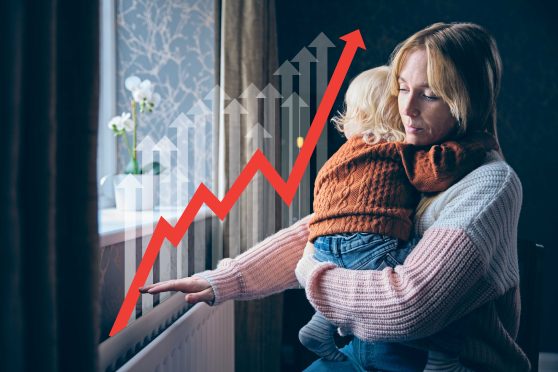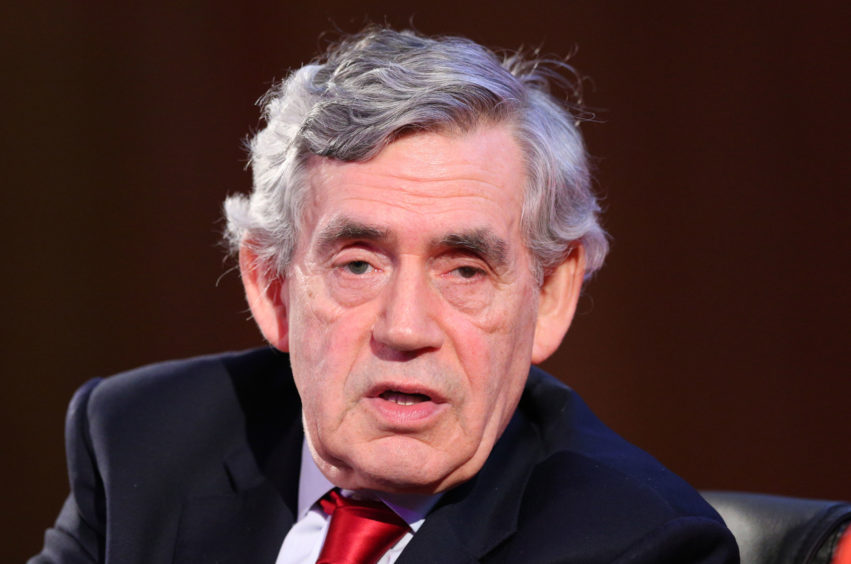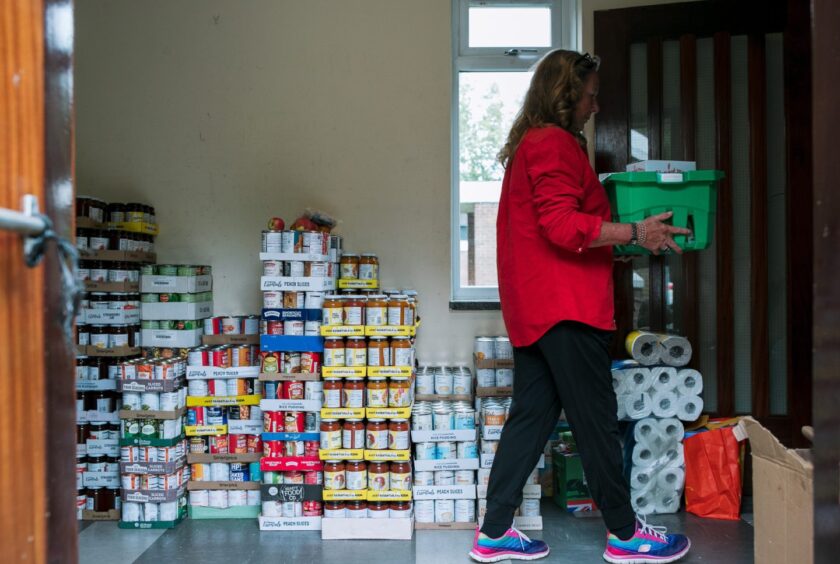
The cost of living crisis is destroying the health of the most vulnerable families and impacting on the NHS, a leading doctor has revealed.
Professor Terry Quinn, a leading geriatrician and Glasgow University professor in cardiovascular ageing, says hospitals are seeing the effects, with more patients presenting with hypothermia and malnutrition.
It mirrors the experience of leading A&E consultant Dr John-Paul Loughrey, who says children are increasingly attending out of hours at emergency units as parents cannot afford to lose a day’s work.
Some parents are waiting for the earliest bus service to start because they can’t afford a taxi, he says.
Quinn said: “Many families are seriously worried about whether they can pay their rent, heat their homes or eat next week.
“We are certainly seeing more patients like this at Glasgow Royal Infirmary.”
The hospital cares for patients in Glasgow’s east end and north side, where patients with Scotland’s lowest life expectancies live.
The elderly and young are most at risk from hypothermia.
Multibanks
It comes as former prime minister Gordon Brown recently told of a father who handed his son into a multibank because he was no longer able to keep him.
The Dickensian plight of the dad is mirrored by a survey of low-income families in Fife that showed 11% of parents say, without essential goods from local charities, their children might be in care.
Brown is helping to establish “multibanks” to provide a range of goods – including clothing, bedding, furniture and hygiene necessities – to those people in need.
He believes many families are at breaking point.
Brown said: “Families across the UK are experiencing poverty-induced hard times on a scale I never thought I would see in my lifetime.
“One million children across Britain are living in destitution. And the trauma being visited upon them by parental poverty is a stain on our national soul.
“A survey by our Cottage Family Centre has revealed that, for 11% of families, the support we are able to give with basic household hygiene goods from our local multibank is now what stands between making the rent or asking for their children be put into care.
“One poor 16-year-old boy was left distraught after being dumped by his father at our Greater Manchester multibank because his father, at his wits’ end, thought he would be better off here.
“Schools, already over-stretched, are now running launderette services to stem a growing public hygiene crisis in their classrooms and to try to prevent stigma (‘you smell’) being attached to their most impoverished pupils.
“Our multibank network is expanding to help families make ends meet and tackle the poverty tsunami that is bringing them to breaking point.”
Child-income poverty in the UK was rated the worst in the world’s richest countries in a report by UN children’s agency Unicef last week.
Scottish families fare slightly better – with £25 a week child benefit paid by the Scottish Government, but that has not risen since November 2022.
As many as 10% of Scottish pensioners (about 100,000) are living in persistent poverty after housing costs, says Age Scotland charity.
UK Government statistics show that almost half the population has cut back on heating their homes because they are scared of energy bills, which have soared 60% for gas and 40% for electricity in the past two years.
The figures from the Office for National Statistics (ONS) show that around half of adults have turned down home heating and are now using less fuel because of cost of living increases.
Food prices have risen 30% over two years further crippling family budgets, the ONS adds. Loughrey, vice-president of the Royal College of Emergency Medicine, said: “We are seeing an increase in the number of children attending A&E later in the day. More and more are coming out of hours (of GPs) to the paediatric department.
“Everyone has noticed the impact the cost of living is making on their bank balances and poorer, more vulnerable families are much more affected.
“From what we can see, some of them cannot reach A&E until first bus services resume because they cannot afford the taxi fares here.
“Patients from deprived areas are more likely to require admission to hospital.
“Family doctors are struggling to cope with workloads. This is the most difficult time in the history of the NHS to be a GP.”
The ONS reported in October that nearly four in 10 families are now struggling to afford payments.
Energy prices will rise next month by another £9 a month on average because of world market prices, says energy regulator Ofgem. Child Poverty Action Scotland says increasing job insecurity, rising food and energy bills, and falling UK Government support all impact seriously on our most vulnerable families.
It said: “Lack of money should never delay a child accessing health care. No family should ever have to rely on foodbanks and charity handouts.
“Children should not have to live in a cold, unfurnished home, and we know that parents go to extraordinary lengths to protect their children from the poverty, but over a decade of eye- watering cuts to UK social security and increasing insecurity at work has left families brutally exposed in this current cost of living crisis.
“We need the UK Government to scrap the two-child benefit cap now.”
The charity adds that it believes the Scottish Government’s child payment does make a difference.
It said: “But stories from the NHS frontline mean the First Minister needs to increase it to £30 from £25.”
The impact of poverty on health comes as many hospitals are already reporting bed occupancy is already at 100%.
Queues of ambulance up to 17 vehicles deep outside hospitals reveal the backlog of crammed wards inside.
No Scottish hospital made the 95% four-hour A&E target of seeing and discharging or admitting patients in that time this winter.
Many report a 50% throughput.
Accident and emergency research shows that waiting more than five hours before admission is linked to a heightened risk of patients dying from any cause within the next 30 days.
“The most deprived patients are more likely to be admitted,” said Loughrey.
“Few hospitals are achieving the four-hour target of 95% of patients waiting no longer than four hours from patients’ arrival to leaving or transfer for treatment.
“Some patients are waiting eight to 12 hours. Hospitals cannot discharge recovering patients to cold homes where they may deteriorate.”
Anne’s story
Keeping a dying man alive gives a huge sense of job satisfaction
A Scottish ambulance paramedic working on the frontline describes the poverty she sees when she attends some families’ medical emergencies.
Anne, not her real name, has worked for well over a decade in the NHS, attending some emergencies that distress even experienced paramedics.
She said: “It’s 9pm and we are called to an adult in their 30s with breathing problems. As we arrive the house is in darkness, except for one lit room, the children’s bedroom.
“The house feels as cold as the outside temperature of 2°C and, in homes like this, often parents don’t eat so that their children can be fed.
“In the living room their mum in her 30s is struggling to breathe and we work to assess and treat her. There’s little in the fridge and the cupboards are almost empty and you find that parents go without meals to feed their children.
“There’s certainly not enough in this home to give the children a decent breakfast in the morning.
“Many paramedics carry small toys in their pockets, the sort that you can pick up in discount shops for a couple of pounds, as treats for the children. When you hand them out, it’s like giving them a big present.
“The mum needs to be transferred to A&E and we leave the children with their dad.
“Some young university student paramedics on placements are shaken and say they couldn’t face working in the NHS.
“You can almost see the light die in their eyes. When patients ask if I like being a paramedic, I tell them I love my job.
“Delivering babies, getting children who have stopped breathing to restart and keeping a dying man alive gives huge job satisfaction.
“But when we roll out of the station to an emergency call, I wonder what we are going to attend.
“As for queueing outside hospitals, the worst I have seen is 17 backed up this winter, and some patients have had to be revived in the back of an ambulance.
“You take the patient’s observations every 15 minutes there. Sometimes we have patients who have not been able to see a GP.
“Many elderly cannot navigate GP websites and not every family has broadband, often the elderly or poor.”
Fully 1.7 million households have no mobile or broadband internet at home, says a recent House of Lords report.
“Up to a million people have cut back or cancelled internet packages in the past year as cost of living challenges bite,” it adds.
Struggling families
The Department for Work and Pensions (DWP) says: “There are 1.7 million fewer people in absolute poverty than in 2010, including 400,000 fewer children, but we know some families are struggling, which is why we are providing support worth around £3,700 per household on average, including raising benefits by over 10% this year.
“The two-child policy asks families on benefits to make the same financial decisions as families supporting themselves solely through work.”
The Scottish Government says: “Reducing health inequalities across Scotland remains a clear ambition for this government.
“We have Community Link Workers and Welfare Rights Advisers embedded into 180 GP practices within our rural, island and deprived communities; who offer advice to patients regarding eligibility for benefits, debt, housing and employability issues.
“The Scottish Government has encouraged GP practices to ensure that there is an appropriate mix of pre-booked, same-day, face-to-face and remote appointments that suits individual practice populations.”
It adds that it is allocating almost £3 billion to support policies to tackle poverty and protect people as far as possible during the cost of living crisis. It also says this includes “making £83.7 million available for discretionary housing payments to prevent people having to pay the bedroom tax, to mitigate the benefit cap as fully as possible and protect against other UK Government welfare cuts”.

Enjoy the convenience of having The Sunday Post delivered as a digital ePaper straight to your smartphone, tablet or computer.
Subscribe for only £5.49 a month and enjoy all the benefits of the printed paper as a digital replica.
Subscribe © Jonathan Brady/PA Wire
© Jonathan Brady/PA Wire © Andrew Cawley
© Andrew Cawley